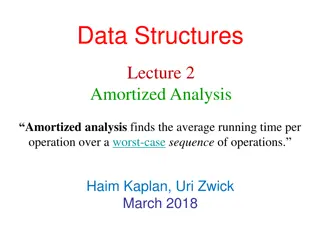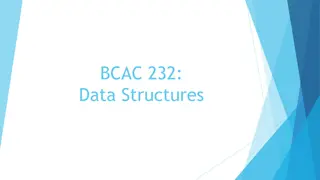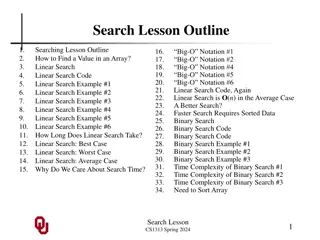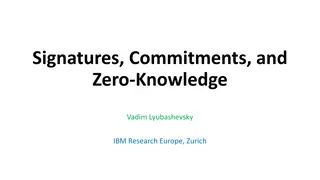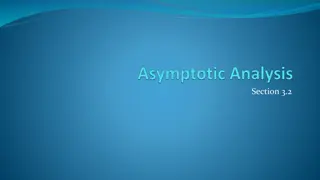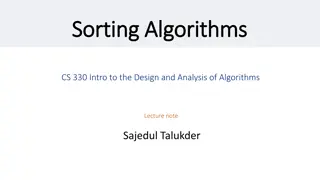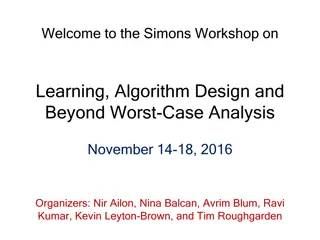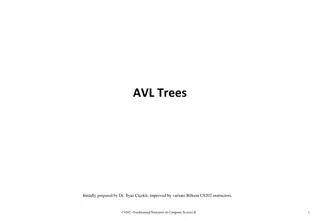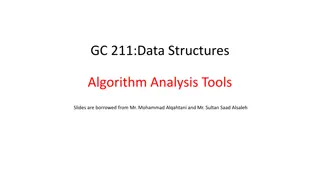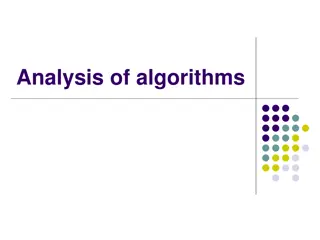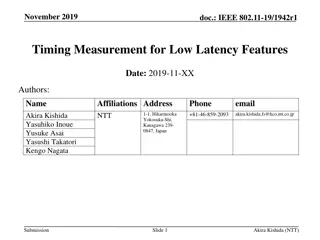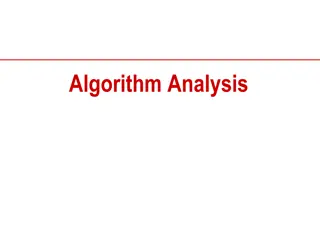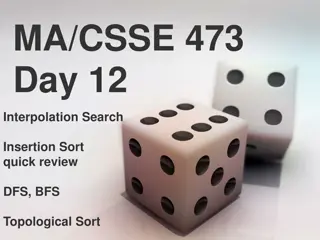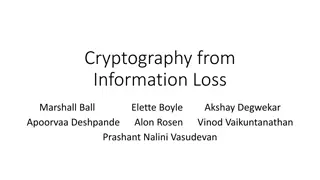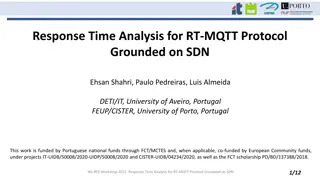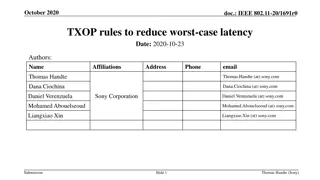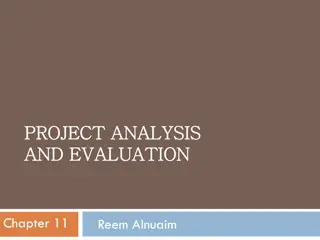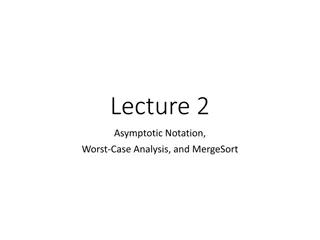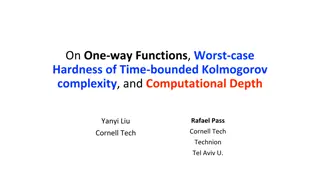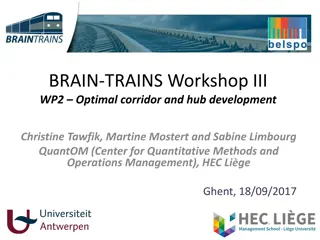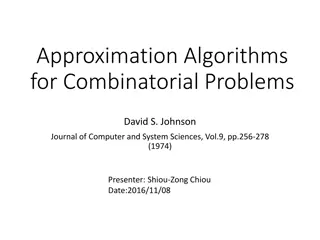Amortized Analysis in Data Structures: Insights and Implementations
Amortized analysis plays a crucial role in understanding the average running time per operation in worst-case scenarios for data structures. This content delves into implementing lists using circular arrays with resizing strategies, lazy deletions in singly linked lists, and explores the costs assoc
3 views • 29 slides
Sorting Techniques in Data Structures
Sorting is the process of arranging elements in a specific order, be it ascending or descending, for efficient data access. This content covers internal and external sorting, types of sorting techniques like Bubble Sort and Quick Sort, factors influencing the selection of sorting techniques, efficie
8 views • 12 slides
Linear Search: A Detailed Guide
Linear search is a fundamental algorithm for finding a value in an array. This guide covers the concept, code implementation, examples, time complexity analysis, and comparison with binary search. Explore how linear search works, its best and worst-case scenarios, and why search time matters in prog
1 views • 34 slides
Impact of Board Thickness Deviations on Wire Displacement
In this study by Lee Greenler at UW Physical Sciences Lab, the effect of side and foot board thickness deviations on wire position was analyzed. The displacement of the wire was found to vary based on the cosine factor, with potential displacements up to ~0.5mm near the pin. Different cases were con
0 views • 5 slides
Signatures, Commitments, and Zero-Knowledge in Lattice Problems
Explore the intricacies of lattice problems such as Learning With Errors (LWE) and Short Integer Solution (SIS), and their relation to the Knapsack Problem. Delve into the hardness of these problems and their applications in building secure cryptographic schemes based on polynomial rings and lattice
4 views • 44 slides
Big-Oh Notation in Time Complexity Analysis
Big-Oh notation in algorithm analysis signifies how the runtime of an algorithm grows in relation to the input size. It abstractly characterizes the worst-case time complexity, disregarding constants and lower-order terms. The concept of Big-Oh, along with Big-Omega and Big-Theta, helps in comparing
0 views • 18 slides
Overview of Sorting Algorithms and Quadratic Sorting - CS 330 Lecture Notes
Sorting algorithms play a crucial role in computer science and computing tasks, consuming a significant portion of computing power. Various algorithms such as Bubble Sort, Selection Sort, and Insertion Sort are discussed for sorting a list of values efficiently. Quadratic sorting algorithms like Sel
0 views • 30 slides
Program Verification Using Templates Over Predicate Abstraction
This research explores a technique that allows for inferring invariants with arbitrary quantification and boolean structure, improving the state-of-the-art in program verification. It can infer weakest preconditions, helping with debugging and analysis by discovering worst-case inputs and missing pr
1 views • 32 slides
Measurement-based WCET Analysis for Multi-core Architectures
This research focuses on providing an inexpensive multi-core solution for safety-critical systems by utilizing unmodified production chips and measurement-based WCET analysis tools. The goal is to enable WCET analysis on multi-core setups while preserving cost, performance, and time-to-market benefi
0 views • 25 slides
Simons Workshop on Learning and Algorithm Design: Beyond Worst-Case Analysis
Simons Workshop on Learning, Algorithm Design, and Beyond Worst-Case Analysis in 2016 featured top organizers and discussed algorithm analysis, instance structures, worst-case scenarios, average-case analysis, and more. The workshop included social events and informative talks.
0 views • 31 slides
Effective Presentation Skills and Hair Analysis in Forensics
Good presenters engage their audience by knowing their subject well, showing passion, and utilizing effective communication strategies such as storytelling and emotion. Examples of successful presenters like Julian Treasure and Ken Robinson demonstrate these skills. On the other hand, poor presentat
0 views • 8 slides
AVL Trees: Balanced Search Trees for Efficient Operations
AVL Trees are balanced search trees that ensure efficient insertion, deletion, and retrieval operations with a worst-case time complexity of O(log N). Named after their inventors Adelson-Velskii and Landis, AVL Trees maintain balance by limiting the height difference between left and right subtrees
0 views • 28 slides
Algorithm Analysis: Understanding Efficient Problem Solving
Algorithm analysis is a methodology used to predict the computational resources an algorithm requires, focusing on computational time rather than memory. It involves assessing the efficiency of different algorithms in solving a single problem. The analysis covers functions like Constant, Logarithm,
0 views • 34 slides
Analysis of Algorithms
Explore the world of algorithms through the lens of analysis. Learn the criteria for evaluating algorithms, understanding running time and memory space, and conducting experimental studies. Delve into limitations of experiments, algorithms and inputs, average case vs. worst case analysis, and the be
0 views • 29 slides
IEEE 802.11-19/1942r1 Timing Measurement for Low Latency Features
The document discusses the necessity of measuring latency and jitter for IEEE 802.11be low-latency functions. It emphasizes the importance of precise measurement methods to evaluate quality and control low-latency features effectively. The presentation highlights the need for timing measurement to r
0 views • 13 slides
Algorithm Analysis and Types: Understanding Running Time and Efficiency
Algorithm analysis involves evaluating the performance and efficiency of algorithms based on different scenarios like worst-case, average-case, and amortized analysis. This analysis helps in understanding the running time of algorithms and making informed decisions about their implementation. Quicks
0 views • 30 slides
Optimizing Response Time Through Stochastic Scheduling
This article explores stochastic scheduling with predictions, aiming to minimize mean response time. It discusses the use of uniform bounds for scheduling with job size estimates and the significance of stochastic analysis in overcoming worst-case barriers. The study delves into two approaches - wor
0 views • 20 slides
Brief Overview of Interpolation Search and Algorithms
Explore Interpolation Search, variable decrease algorithms, and the efficiency of Insertion Sort. Understand the concept of decreasing by constant amount, factor or variable, and discover how interpolation search estimates the location of a key in a sorted array. Dive into the running time analysis
0 views • 30 slides
Cryptography and Hard Problems: Exploring Structure and Complexity
This content delves into the intricate world of cryptography, focusing on the challenges posed by hard problems with sufficient structure. It discusses various aspects such as hardness, structure, statistical zero-knowledge proofs, one-way functions, worst-case and average-case hardness, lossy reduc
0 views • 27 slides
Response Time Analysis for RT-MQTT Protocol Grounded on SDN
Industry 4.0 and IIoT in Industrial Operations demand timing behavior, predictability, and stability. This work focuses on analyzing response time for the RT-MQTT protocol based on SDN architecture, addressing real-time requirements. The study formalizes the RT-MQTT system model and demonstrates wor
0 views • 12 slides
IEEE 802.11-20/1691r0 TXOP Rules to Reduce Worst-Case Latency
This document discusses proposals aimed at reducing average and worst-case latency in low latency services provided by IEEE 802.11be. It addresses issues related to retransmissions and outlines new rules for TXOP configuration to improve response times in case of missing responses.
0 views • 18 slides
Randomized Algorithms
Randomized algorithms provide efficient solutions to complex problems by leveraging randomness. From finding global minimum cuts to exploring distributed algorithms, this lecture series delves into the realm of randomized complexity classes. Through examples and discussions on differential privacy a
0 views • 21 slides
Electric Vehicle Load Shape Analysis
In this analysis, explore the grid impacts of worst and best-case EV charging scenarios, separate from the adopted cases. Dive into hourly load shapes, modeling inputs, and summer day load shapes to assess potential system impacts. Understand the distribution of EV load across peak summer periods an
0 views • 14 slides
Cryptographic Complexity of the Worst Functions Unveiled
Delve into the cryptographic complexity of the worst functions with expert insights from Amos Beimel, Yuval Ishai, Ranjit Kumaresan, and Eyal Kushilevitz. Explore the models, security considerations, and advancements in secure computation within information-theoretic frameworks. Understand the chall
0 views • 46 slides
Advanced Real-Time Analysis for Automotive Systems
Explore real-time scheduling models, critical instants, utilization and worst-case response time analysis, context switches, interrupt handling, and more in the context of automotive systems. Understand the essential parameters and conditions for effective system performance.
0 views • 40 slides
Understanding Low Latency Capability for 802.11be: Discussion and Analysis
Delve into the discussions on enhancing low latency capability for 802.11be technology, addressing real-time application use cases, potential technologies, and latency definitions. Explore the motivation behind minimizing worst-case latency and jitter, with a focus on improving latency for various a
0 views • 20 slides
Understanding Stability in Multiserver Job Systems
Explore stability in multiserver job systems through two types of analysis: worst-case and stochastic analysis. Learn about stochastic models of data centers, parallel job models, and the vital question of stability and throughput. Gain insights into waste, prior results, and an elegant analytical f
1 views • 35 slides
Evaluating NPV Estimates and Scenario Analysis in Project Analysis
Explore how to evaluate NPV estimates in project analysis, assess forecasting risk, and conduct scenario analysis to understand the impact of different cash flow scenarios. Learn about the sources of value creation in projects and the significance of positive NPV. Discover the importance of scenario
1 views • 53 slides
Analyzing Algorithms Beyond Worst-Case Scenarios
Explore the book "Beyond Worst-Case Analysis of Algorithms" by Uriel Feige from the Weizmann Institute, delving into chapters on topics like Perturbation Resilience, Approximation Stability, and more. Enhance your understanding of computational complexity and deepen your knowledge with potential cha
0 views • 43 slides
Optimizing Algorithm Efficiency Through Asymptotic Notation and Sort Complexity
Explore concepts of asymptotic notation, worst-case analysis, and MergeSort in computer science. Get ready for the upcoming midterm, ACE section, homework releases, and office hours. Learn about sorting algorithms and their impact on performance.
0 views • 86 slides
Understanding One-way Functions and Worst-case Hardness in Complexity Theory
Delve into the world of one-way functions (OWF) and explore their significance in computational complexity theory. Discover how OWFs are intertwined with worst-case hardness and time-bounded Kolmogorov complexity, shedding light on the challenges and implications they present in modern cryptography.
0 views • 15 slides
Understanding Algorithm Complexity Analysis
Explore the fundamental concepts of algorithm analysis, including time complexity, space complexity, asymptotic analysis, operation counting, best-case, worst-case, and average-case scenarios. Dive into scaling analysis to understand the growth rate of functions and the significance of constant mult
0 views • 35 slides
Understanding Analysis of Algorithms and Time Complexity
Explore the concept of analysis of algorithms, time and space complexity, average vs worst-case running time, measuring running time, and the limitations of experimental studies. Gain insights into the essential aspects of algorithm analysis.
0 views • 20 slides
Optimal Corridor and Hub Development - Workshop Insights
Explore the strategic analysis from the BRAIN-TRAINS Workshop focusing on optimal corridor and hub development for intermodal rail freight. Learn about the best-case and worst-case scenarios, policy impacts, and operational changes to make informed decisions. Dive into numerical optimization, cost m
0 views • 10 slides
Understanding the Impacts of the Worst EVD Outbreak
Explore the epidemiological situation, key findings, and policy recommendations regarding the worst Ebola outbreak in recent history. Delve into the geographical coverage, affected populations, economic implications, and more, to understand the magnitude of the crisis and the need for a comprehensiv
0 views • 24 slides
Analysis of Approximation Algorithms for Combinatorial Problems
In this study, heuristic algorithms for approximate solutions to polynomial complete optimization problems are examined, evaluating their worst-case behavior and performance compared to optimal solutions. Various combinatorial problems such as the knapsack problem, set covering problems, and finding
0 views • 32 slides
Understanding Time Complexity Analysis in Non-Recursive Algorithms
Dive into the essential concepts of time complexity analysis, including true/false statements about algorithm efficiency, analyzing complexity, types of analyses (worst case, best case, average case), and a general plan for evaluating the efficiency of non-recursive algorithms. Explore examples like
0 views • 23 slides
Advanced Data Structures and Algorithms Overview
Explore a comprehensive review of advanced data structures and algorithms, covering topics like binary search trees, heaps, B-trees, time analysis, and more. Enhance your understanding of tree structures, traversal methods, and their applications in different algorithms. Discover the complexities of
0 views • 13 slides
Sorting Algorithms and Performance Analysis
Learn about various sorting algorithms such as Bubble Sort, Selection Sort, and their performance analysis in terms of worst case, best case, and average case scenarios. Explore how efficient sorting is essential for optimizing other algorithms that require input data in sorted lists and how it aids
0 views • 27 slides
Understanding Expectimax Search: Uncertainty in Game AI
Discover the concept of Expectimax search in game AI, where uncertainty plays a key role in decision-making. Explore how average-case outcomes are considered over worst-case scenarios, and how to calculate expected utilities in game nodes with uncertain outcomes.
0 views • 43 slides
